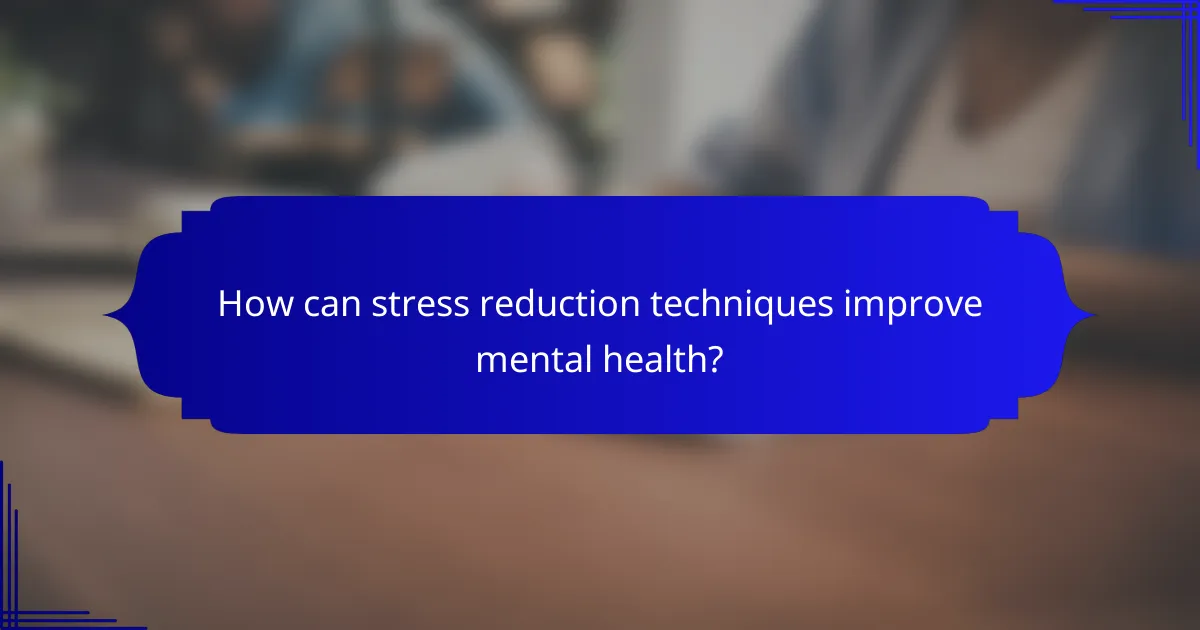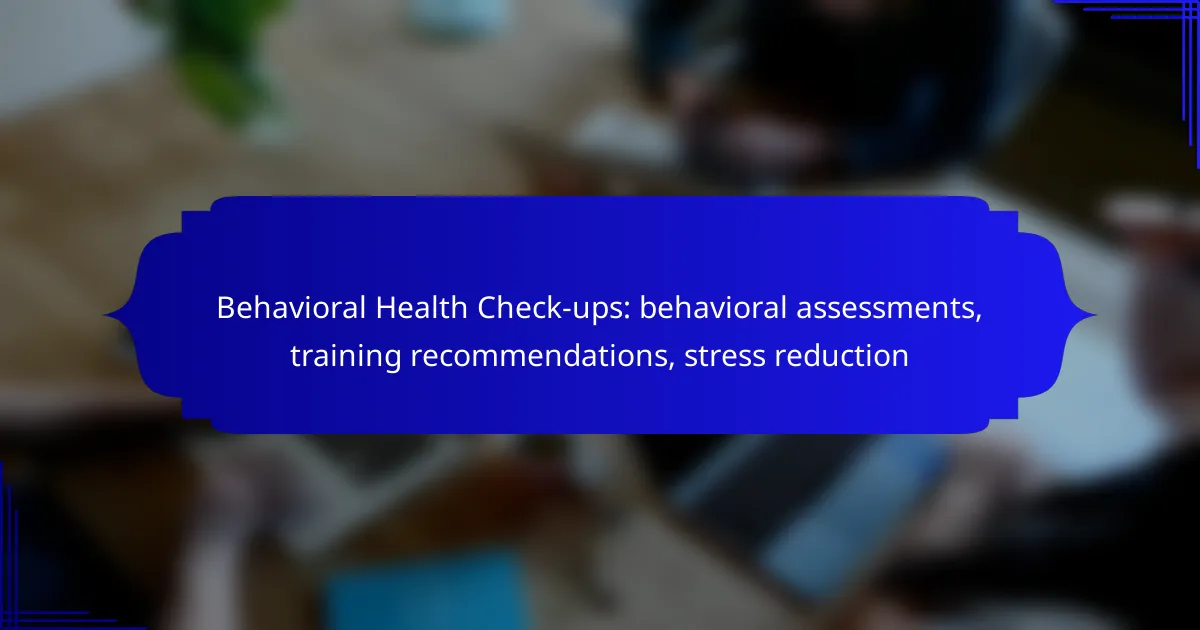Behavioral health check-ups are vital for identifying mental health issues early and promoting overall well-being. Through comprehensive assessments, individuals can gain insights into their behavior patterns and receive tailored recommendations for training and stress reduction strategies. This proactive approach not only enhances coping mechanisms but also fosters resilience and a better quality of life.

What are the benefits of behavioral health check-ups in Australia?
Behavioral health check-ups in Australia provide essential benefits such as early detection of mental health issues, enhanced overall well-being, and improved coping strategies. These assessments help individuals address their mental health proactively, leading to better life quality and resilience.
Early identification of mental health issues
Behavioral health check-ups facilitate the early identification of mental health issues, allowing for timely intervention. Regular assessments can uncover conditions like anxiety, depression, or stress before they escalate, which is crucial for effective treatment.
In Australia, mental health screenings often include standardized questionnaires and interviews that help clinicians evaluate an individual’s emotional state. Early detection can significantly improve outcomes, reducing the risk of severe mental health crises.
Improved overall well-being
Engaging in regular behavioral health check-ups contributes to improved overall well-being by promoting mental clarity and emotional stability. Individuals who participate in these assessments often report higher satisfaction levels in their personal and professional lives.
Incorporating recommendations from these check-ups, such as lifestyle changes or therapy, can enhance physical health as well. For instance, addressing stress through mindfulness practices can lead to better sleep and increased energy levels.
Enhanced coping strategies
Behavioral health check-ups equip individuals with enhanced coping strategies to manage stress and emotional challenges. Through tailored recommendations, individuals learn practical techniques to navigate life’s pressures more effectively.
Common strategies include cognitive-behavioral techniques, stress management exercises, and mindfulness practices. These tools not only help in immediate situations but also build long-term resilience against future challenges.

How do behavioral assessments work?
Behavioral assessments evaluate an individual’s mental health and behavior patterns through various methods. These assessments help identify issues, guide treatment plans, and recommend training or stress reduction strategies.
Standardized questionnaires
Standardized questionnaires are structured tools designed to measure specific behavioral traits or symptoms. They often include multiple-choice or Likert-scale questions that provide quantifiable data on an individual’s mental health status.
Common examples include the Beck Depression Inventory and the Generalized Anxiety Disorder 7-item scale (GAD-7). These tools help clinicians compare results against established norms and identify areas needing attention.
Clinical interviews
Clinical interviews involve direct conversations between a trained professional and the individual being assessed. This method allows for in-depth exploration of the person’s thoughts, feelings, and behaviors, providing context that questionnaires may miss.
During these interviews, clinicians often use open-ended questions to encourage discussion, which can reveal underlying issues. It’s essential to create a comfortable environment to foster honest communication.
Observation techniques
Observation techniques involve monitoring an individual’s behavior in various settings, such as at home, school, or work. This method provides real-time insights into how a person interacts with their environment and others.
Professionals may use structured observation forms to document specific behaviors and patterns over time. This approach can help identify triggers for stress or other behavioral issues, leading to more tailored interventions.

What training recommendations are available for mental health professionals?
Mental health professionals can enhance their skills through various training programs tailored to improve their practice. These recommendations focus on trauma-informed care, cognitive-behavioral therapy, and mindfulness techniques to effectively address client needs.
Trauma-informed care training
Trauma-informed care training equips mental health professionals with the knowledge to recognize and respond to the effects of trauma on clients. This approach emphasizes safety, trustworthiness, and empowerment, ensuring that services are sensitive to the needs of individuals who have experienced trauma.
Training typically includes understanding trauma’s impact on behavior and mental health, as well as strategies for creating a supportive environment. Professionals should seek programs that offer practical tools and case studies to apply these principles in real-world settings.
Cognitive-behavioral therapy workshops
Cognitive-behavioral therapy (CBT) workshops provide mental health professionals with techniques to help clients identify and change negative thought patterns. These workshops often include role-playing, case discussions, and skill-building exercises to enhance therapeutic effectiveness.
Participants can expect to learn about various CBT techniques, such as cognitive restructuring and behavioral activation. It’s advisable to choose workshops that offer continuing education credits and are led by experienced practitioners to ensure quality training.
Mindfulness and stress reduction courses
Mindfulness and stress reduction courses teach mental health professionals how to incorporate mindfulness practices into their therapeutic work. These courses focus on techniques such as meditation, breathing exercises, and mindful observation to help clients manage stress and improve emotional regulation.
Professionals should look for courses that provide hands-on practice and evidence-based strategies. Additionally, integrating these practices into therapy can enhance client engagement and promote overall well-being. Regular participation in mindfulness training can also benefit the professionals themselves, reducing burnout and enhancing their own mental health.

How can stress reduction techniques improve mental health?
Stress reduction techniques can significantly enhance mental health by lowering anxiety levels, improving mood, and fostering emotional resilience. By incorporating these practices into daily routines, individuals can better manage stressors and promote overall well-being.
Mindfulness meditation practices
Mindfulness meditation involves focusing on the present moment, which can help reduce stress and anxiety. Regular practice, even for a few minutes each day, can lead to improved emotional regulation and increased self-awareness.
To begin, find a quiet space and sit comfortably. Close your eyes and concentrate on your breath, allowing thoughts to come and go without judgment. Aim for sessions lasting between 5 to 20 minutes, gradually increasing as you become more comfortable.
Physical exercise benefits
Engaging in physical exercise is a powerful way to alleviate stress and boost mental health. Activities such as walking, running, or yoga can release endorphins, which are natural mood lifters.
For optimal benefits, aim for at least 150 minutes of moderate aerobic activity each week. Incorporating strength training exercises twice a week can further enhance overall well-being and resilience to stress.
Breathing exercises
Breathing exercises can quickly reduce stress by promoting relaxation and lowering heart rate. Techniques such as deep breathing or the 4-7-8 method can be practiced anywhere and at any time.
To practice deep breathing, inhale deeply through your nose for a count of four, hold for seven seconds, and exhale slowly through your mouth for a count of eight. Repeat this cycle several times to experience a calming effect.

What are the prerequisites for effective behavioral health check-ups?
Effective behavioral health check-ups require a thorough understanding of the patient’s history and the establishment of a strong therapeutic relationship. These prerequisites help ensure accurate assessments and tailored recommendations for training and stress reduction.
Understanding patient history
Gathering detailed patient history is crucial for effective behavioral health check-ups. This includes previous diagnoses, treatment responses, and any relevant family history of mental health issues. A comprehensive understanding allows healthcare providers to identify patterns and tailor interventions accordingly.
When collecting patient history, consider using standardized questionnaires or structured interviews to ensure consistency. This can help in identifying specific stressors or behavioral patterns that may influence the patient’s current state. For instance, a patient with a history of anxiety may require different strategies compared to someone with a background of depression.
Establishing a therapeutic relationship
Building a therapeutic relationship is essential for effective behavioral health check-ups. Trust and rapport between the patient and provider facilitate open communication, enabling patients to share their concerns more freely. This relationship is foundational for accurate assessments and successful interventions.
To foster a strong therapeutic relationship, practitioners should practice active listening and empathy. Simple techniques such as maintaining eye contact, validating feelings, and providing a non-judgmental space can significantly enhance the patient’s comfort level. Regular follow-ups and consistent support also reinforce this relationship, making patients more likely to engage in their treatment plans.

How do behavioral health check-ups differ across Australia?
Behavioral health check-ups in Australia vary significantly by region, influenced by local healthcare policies, available resources, and cultural factors. These assessments typically focus on mental health, stress management, and behavioral patterns, tailored to meet the needs of diverse populations.
Behavioral assessments
Behavioral assessments in Australia often involve standardized questionnaires and interviews to evaluate mental health and emotional well-being. Practitioners may use tools like the Kessler Psychological Distress Scale (K10) or the Depression Anxiety Stress Scales (DASS) to gauge an individual’s psychological state.
These assessments can help identify issues such as anxiety, depression, and stress-related disorders. Depending on the results, practitioners may recommend further evaluation or immediate intervention, ensuring that individuals receive appropriate care based on their specific needs.
Training recommendations
Training recommendations following behavioral assessments in Australia focus on skill development for managing stress and improving mental health. Programs may include cognitive-behavioral therapy (CBT), mindfulness training, or resilience-building workshops tailored to individual or group settings.
Healthcare providers often suggest regular participation in these training sessions, which can last from a few weeks to several months. This ongoing engagement helps individuals develop coping strategies and enhances their overall emotional resilience.
Stress reduction
Stress reduction techniques in Australia encompass a variety of approaches, including physical activity, relaxation exercises, and social support. Common practices include yoga, meditation, and engaging in hobbies that promote relaxation and well-being.
Healthcare professionals often recommend integrating these stress reduction strategies into daily routines. Simple actions, such as taking short breaks during work or practicing deep-breathing exercises, can significantly lower stress levels and improve mental health outcomes.
